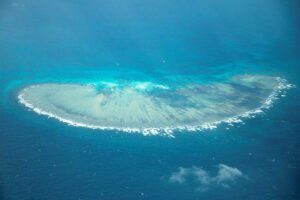
Philippines to sue China if evidence shows cyanide use in Scarborough
By Kyle Aristophere T. Atienza, Reporter
PRESIDENT Ferdinand R. Marcos, Jr. said on Tuesday that the Philippine government would file cases against China once it is proven that Chinese fishermen had used cyanide in Scarborough Shoal, a traditional fishing ground that is well within Manila’s 200-nautical mile exclusive economic zone.
“If we feel that there is enough ground to do so, we will,” he told reporters on the sidelines of an event in Manila.
Citing reports from Filipino fishermen, the Bureau of Fisheries and Aquatic Resources (BFAR) last week said Chinese and Vietnamese fishermen have been using the deadly chemical compound in Scarborough Shoal.
“The best that we know is that there really is as far as we can tell. According to BFAR, it is really being used, some are also saying that it has been happening for a long time now,” Mr. Marcos said.
He said it is more alarming that cyanide use has been prevalent in Philippine waters.
“I do know that there have been cases of cyanide fishing before, even here in the Philippines, but I think the reason that it has been more alarming is that it has become more prevalent,” he said.
On Monday, Jonathan E. Malaya, spokesman of the National Security Council, said a national task force handling tensions in the South China Sea had ordered the fisheries bureau to gather pieces of evidence to support its claims.
Mr. Malaya said once the report is confirmed, it will be submitted to the Office of the Solicitor General and the Department of Justice “to determine if there’s prima facie evidence of wrongdoing and who’s responsible.”
“Our lawyers will take it from there,” he said.
A 2016 arbitral ruling that invalidated China’s expansive claims in the South China Sea recognized the traditional fishing rights of small-scale Filipino and Chinese fishermen in Scarborough Shoal, which is locally known as Bajo de Masinloc.
BFAR spokesperson Nazario C. Briguera on Feb. 17 said, “the Chinese intentionally destroy Bajo de Masinloc to prevent Filipino fishing boats from fishing in the area,” noting that parts of the shoal have already been destroyed with estimated damage exceeding P1 billion.
“This destruction of coral reefs in Bajo de Masinloc is a clear case of illegal, unreported, and unregulated (IUU) fishing,” he said.
The Philippine Coast Guard’s spokesman for the West Philippine Sea, Jay Tristan Tarriela, had said they didn’t have “any scientific study or any evidence that would suggest that cyanide fishing in Bajo de Masinloc can be attributed to the Chinese or the Vietnamese fishermen.”
Fisherfolk group Pamalakaya said recently that Filipino fishermen have long reported their Chinese counterparts’ use of cyanide, adding that the Philippine government under various administrations “has taken no action to stop the destruction of the Philippine fisheries.”
China has already dismissed the BFAR’s claim, calling it a “sheer fabrication.”
“The Chinese government attaches great importance to the protection of eco-environment and conservation of fishing resources and resolutely fights against fishing activities that violate laws and regulations,” Chinese foreign ministry spokesperson Mao Ning said at a Monday briefing.
The Chinese embassy in Manila, meanwhile, accused the Philippine government of “continuous disinformation,” which it said has “led up to nothing but exacerbation of the maritime tensions and destabilization of bilateral relations.”
Scarborough Shoal has been a major source of tensions between the countries, with the Chinese Coast Guard preventing Filipino fishermen from doing fishing activities in the area.
The shoal is 240 kilometers west of the Philippine main island Luzon and is nearly 900 kilometers from Hainan, the nearest major Chinese landmass.
In mid-January, a China Coast Guard ship deployed a rubber boat to chase a small boat of Filipino fishermen collecting shells in the vicinity of the shoal. One of the five Chinese personnel forced them to return the shells to the sea before being allowed to leave. They were subsequently driven away.
China has effectively controlled Scarborough, which is also claimed by several other countries, in 2012 after maintaining constant coast guard presence there, according to the Asia Maritime Transparency Initiative.



